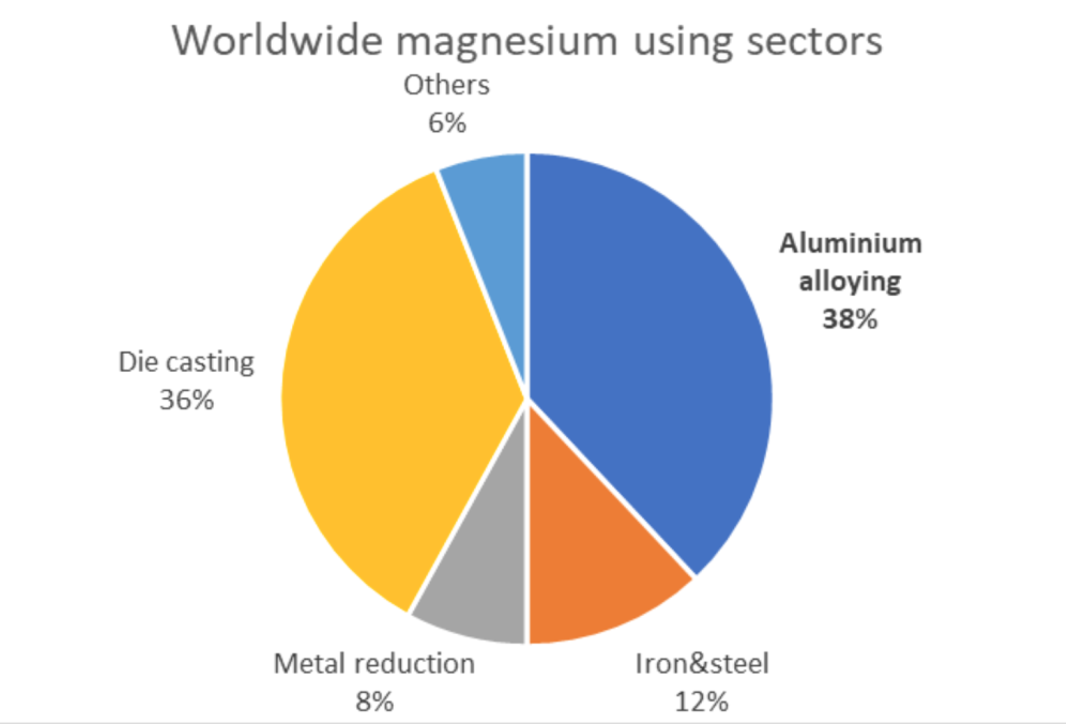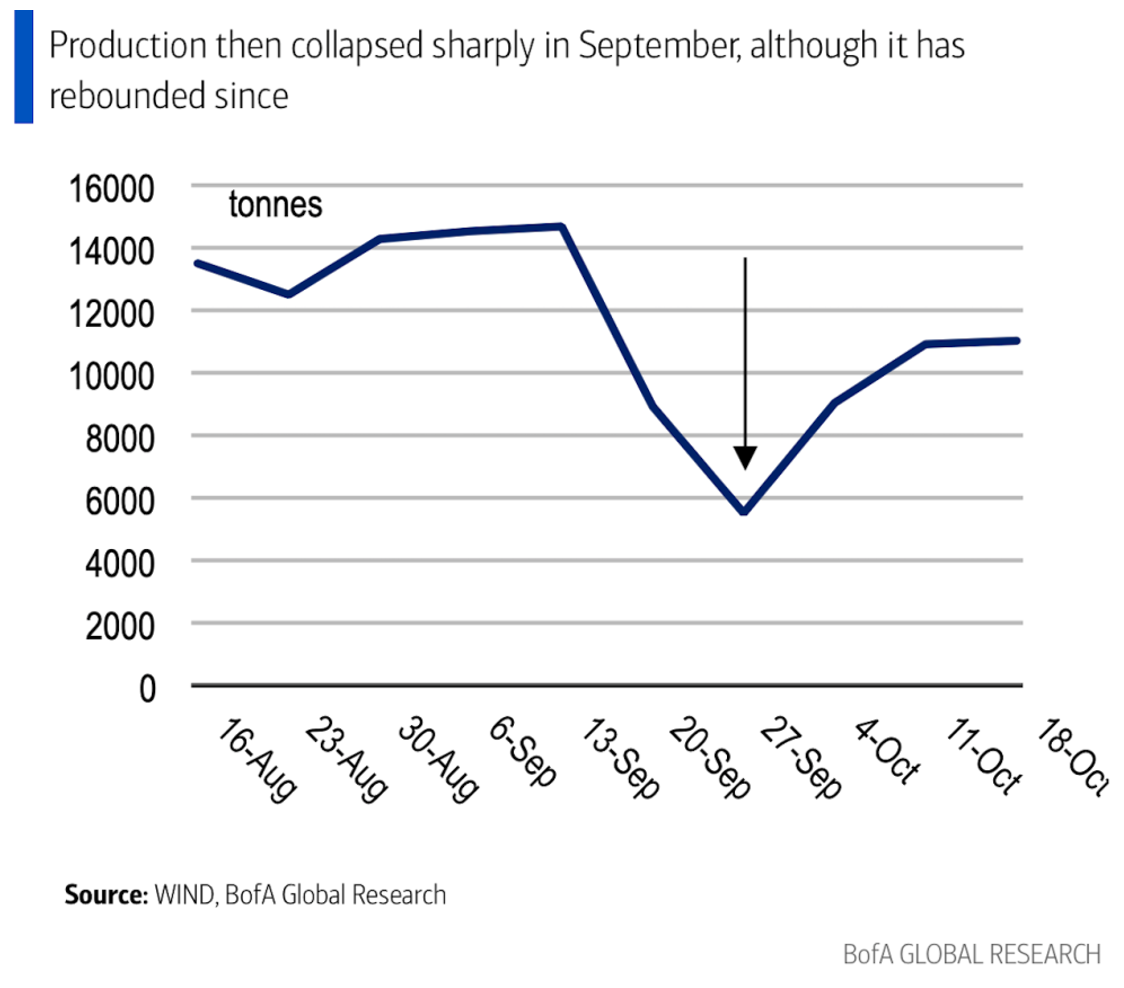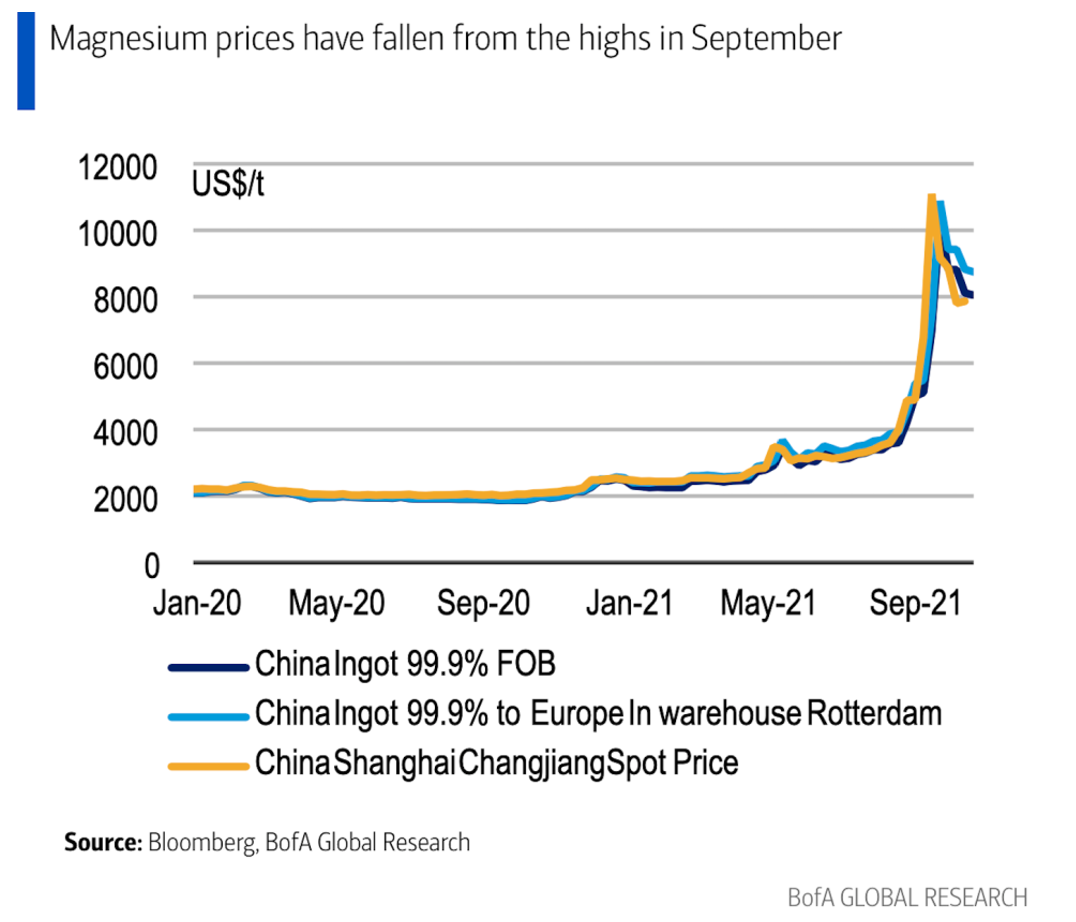好消息是,全球汽車行業似乎已經度過了芯片短缺最嚴重的階段。
福特(Ford)、梅賽德斯-奔馳(Mercedes-Benz)以及大眾(Volkswagen)等汽車制造商均表示,近期因為馬來西亞芯片封裝廠出現新冠疫情導致停工而引發的供應中斷或將在第四季度有所緩解。
壞消息是,新一輪關鍵原材料短缺危機或許已經在醞釀之中。
制造商正在密切關注中國的鎂產量變化,由于電力短缺,中國各地輪流限電,導致能源密集型冶煉廠的供應受到影響。作為一種應用廣泛的輕質材料,全球每年對鎂的需求高達120萬公噸,為減輕汽車零件(包括車身零件、引擎座、輪圈等)的重量,許多鋁合金中都含有這種材料。

大眾汽車集團(Volkswagen Group)的采購經理穆拉特·阿克塞爾在10月28日告訴分析師,為應對供應或將變得愈發緊張的情況,其團隊已經采取相應對策。
他在一次電話會議上說:“按照目前的情況,鎂、鋁供應出現短缺在所難免,只是我們現在還無法預測相關短缺是否會比半導體的短缺問題更嚴重。”
今年9月,鎂產量大幅下降,美國銀行(Bank of America)的分析師特別指出,在擁有豐富煤炭資源的中國內蒙古,冶煉廠也已經被迫停產。11月3日,剩余鎂原料的進口價格在每噸1萬到1.4萬美元之間,而在今年早些時候,其進口價格僅為約2000美元。
根據這家投資銀行的數據,歐洲95%的鎂供應來自中國,受影響最為嚴重。據目前估計,歐洲的鎂庫存將于11月底耗盡。

他們寫道:“如果鋁企的鎂原料耗盡,那么原料短缺問題就將迅速傳導至下游企業,導致供應鏈問題進一步惡化。”
“空前規模的危機”
至少12家歐洲游說團體(包括代表汽車制造商和零部件供應商利益的團體)在一份聲明中發出警告,表示或將出現“規模空前的國際供應危機”。
他們寫道:“如果歐盟(European Union)不采取緊急行動,鎂短缺問題就將危及歐洲各地的數千家企業、及其整個供應鏈和數百萬就業崗位。”
雖然作為一個整體,制造業在大聲疾呼,尋求援助,但個體企業卻在努力避免發出如此絕望的聲音。以寶馬(BMW)為例(該公司在芯片危機中的表現優于大多數公司),其高管甚至在上周表示對鎂、鋁合金的供應完全不擔心。
梅賽德斯-奔馳的首席財務官哈拉爾德·威廉在11月5日對記者表示,奔馳正在評估其供應鏈面臨的風險,并將考慮是否轉而采購鎂含量較低或完全不含鎂的材料。
他說:“據我了解,(鎂產量下跌)是因為中國某些省份為滿足碳排放要求而采取限電措施所致。有些人可能會覺得我這么說有些幼稚或者太過樂觀,但在我們看來,鎂、鋁供應并不存在結構性問題(就像半導體芯片的情況一樣),中國也并未打算停止向世界供應鎂原料。”

據由標致雪鐵龍集團(PSA Group)與菲亞特-克萊斯勒(Fiat Chrysler)合并成立的法美汽車制造商Stellantis預計,其鎂鋁庫存不會很快耗盡。
該公司的首席財務官理查德·帕爾默于11月4日向分析師表示:“短期內我們不會出現任何問題。在我們的主要市場,鋁材都以本地采購為主。遺憾的是,中國目前不是我們的主要市場。如果相關問題在中期開始(蔓延)到其他市場,那么我們可能也會遇到問題,不過至少就目前而言還不用太過擔心。”
除了汽車制造業,另一需要大量輕質材料的重要行業——航空制造業也可能會受到原材料短缺的影響。
就目前而言,空中客車(Airbus)的首席執行官紀堯姆·傅里對分析師表示,他們的業務尚未受到任何重大干擾。
他說:“我知道我們的團隊也在密切關注相關問題。”(財富中文網)
譯者:梁宇
審校:夏林
好消息是,全球汽車行業似乎已經度過了芯片短缺最嚴重的階段。
福特(Ford)、梅賽德斯-奔馳(Mercedes-Benz)以及大眾(Volkswagen)等汽車制造商均表示,近期因為馬來西亞芯片封裝廠出現新冠疫情導致停工而引發的供應中斷或將在第四季度有所緩解。
壞消息是,新一輪關鍵原材料短缺危機或許已經在醞釀之中。
制造商正在密切關注中國的鎂產量變化,由于電力短缺,中國各地輪流限電,導致能源密集型冶煉廠的供應受到影響。作為一種應用廣泛的輕質材料,全球每年對鎂的需求高達120萬公噸,為減輕汽車零件(包括車身零件、引擎座、輪圈等)的重量,許多鋁合金中都含有這種材料。
大眾汽車集團(Volkswagen Group)的采購經理穆拉特·阿克塞爾在10月28日告訴分析師,為應對供應或將變得愈發緊張的情況,其團隊已經采取相應對策。
他在一次電話會議上說:“按照目前的情況,鎂、鋁供應出現短缺在所難免,只是我們現在還無法預測相關短缺是否會比半導體的短缺問題更嚴重。”
今年9月,鎂產量大幅下降,美國銀行(Bank of America)的分析師特別指出,在擁有豐富煤炭資源的中國內蒙古,冶煉廠也已經被迫停產。11月3日,剩余鎂原料的進口價格在每噸1萬到1.4萬美元之間,而在今年早些時候,其進口價格僅為約2000美元。
根據這家投資銀行的數據,歐洲95%的鎂供應來自中國,受影響最為嚴重。據目前估計,歐洲的鎂庫存將于11月底耗盡。
他們寫道:“如果鋁企的鎂原料耗盡,那么原料短缺問題就將迅速傳導至下游企業,導致供應鏈問題進一步惡化。”
“空前規模的危機”
至少12家歐洲游說團體(包括代表汽車制造商和零部件供應商利益的團體)在一份聲明中發出警告,表示或將出現“規模空前的國際供應危機”。
他們寫道:“如果歐盟(European Union)不采取緊急行動,鎂短缺問題就將危及歐洲各地的數千家企業、及其整個供應鏈和數百萬就業崗位。”
雖然作為一個整體,制造業在大聲疾呼,尋求援助,但個體企業卻在努力避免發出如此絕望的聲音。以寶馬(BMW)為例(該公司在芯片危機中的表現優于大多數公司),其高管甚至在上周表示對鎂、鋁合金的供應完全不擔心。
梅賽德斯-奔馳的首席財務官哈拉爾德·威廉在11月5日對記者表示,奔馳正在評估其供應鏈面臨的風險,并將考慮是否轉而采購鎂含量較低或完全不含鎂的材料。
他說:“據我了解,(鎂產量下跌)是因為中國某些省份為滿足碳排放要求而采取限電措施所致。有些人可能會覺得我這么說有些幼稚或者太過樂觀,但在我們看來,鎂、鋁供應并不存在結構性問題(就像半導體芯片的情況一樣),中國也并未打算停止向世界供應鎂原料。”
據由標致雪鐵龍集團(PSA Group)與菲亞特-克萊斯勒(Fiat Chrysler)合并成立的法美汽車制造商Stellantis預計,其鎂鋁庫存不會很快耗盡。
該公司的首席財務官理查德·帕爾默于11月4日向分析師表示:“短期內我們不會出現任何問題。在我們的主要市場,鋁材都以本地采購為主。遺憾的是,中國目前不是我們的主要市場。如果相關問題在中期開始(蔓延)到其他市場,那么我們可能也會遇到問題,不過至少就目前而言還不用太過擔心。”
除了汽車制造業,另一需要大量輕質材料的重要行業——航空制造業也可能會受到原材料短缺的影響。
就目前而言,空中客車(Airbus)的首席執行官紀堯姆·傅里對分析師表示,他們的業務尚未受到任何重大干擾。
他說:“我知道我們的團隊也在密切關注相關問題。”(財富中文網)
譯者:梁宇
審校:夏林
The good news is the worst of the global chip shortage seems to be behind the auto industry.
Carmakers from Ford to Mercedes-Benz and Volkswagen have all indicated that the supply hiccups that were caused by recent COVID-related stoppages in Malaysian chip packaging plants appear to be easing in the fourth quarter.
The bad news is the next shortage of a key raw material could already be on its way.
Manufacturers are keeping a close eye on production levels of magnesium coming out of China, where a lack of power has led to rolling blackouts that hobble supply from energy-intensive smelters. Annual demand for the strong, lightweight material weighs in at 1.2 million metric tons, and it is found in many aluminum alloys to reduce the weight of car components ranging from body parts to engine blocks and wheel rims.
Volkswagen Group purchasing manager Murat Aksel told analysts on October 28 that his team was already taking countermeasures in the likely event that the supply becomes tighter.
“We cannot forecast right now if the shortage in magnesium and aluminum, which will happen definitely according to planning, will be bigger than the semiconductor shortage,” he said during a conference call.
Magnesium production dropped sharply in September, with analysts from Bank of America pointing in particular to smelters in coal-rich Inner Mongolia that were forced to shut down. November 3’s remaining magnesium imports are trading at prices of about $10,000 to $14,000 per metric ton, up from just around $2,000 earlier this year.
Europe, the most exposed region, with 95% of supply sourced from China, is currently expected to deplete its magnesium stocks by the end of November, according to the investment bank.
“If aluminum producers ran out of magnesium, this would quickly feed through downstream, further exacerbating supply-chain issues,” they wrote.
“Crisis of unprecedented magnitude”
No less than a dozen different European lobby groups, including those representing the interests of vehicle manufacturers and component suppliers, warned of an “international supply crisis of unprecedented magnitude” in a statement.
“Without urgent action by the European Union, this issue—if not resolved—threatens thousands of businesses across Europe, their entire supply chains, and the millions of jobs that rely on them,” they wrote.
Despite the manufacturing industry's impassioned plea for help, individual corporations have avoided sounding so desperate. Executives at BMW, which navigated the chip crisis better than most, even dismissed the concerns over magnesium and alloyed aluminum outright last week.
Mercedes-Benz finance chief Harald Wilhelm told reporters on November 5 the carmaker was evaluating the risk to its supply chain and examining whether to divert purchases to materials with reduced magnesium content or none at all.
"To my understanding this is due to power shutdowns in certain Chinese provinces that need to reach CO2 targets," he said. "I don't want to sound naive and overly optimistic, but in our view there's no structural problem (as is the case with semiconductor chips), nor do we see the threat that China no longer intends to supply the world with magnesium."
Stellantis, the Franco-American carmaker that emerged from PSA Group's acquisition of Fiat Chrysler, doesn’t expect its inventories of magnesium-alloyed aluminum will run out soon.
“In the short term we’re not seeing any issues. The sourcing of aluminum is relatively localized in our major markets,” finance chief Richard Palmer told analysts on November 4. “Unfortunately China is not a major market for us at this stage. If the issues there start to [spread to] other markets in the medium term, we’ll see. But we’re not seeing anything at the moment.”
Carmakers are not the only ones exposed. The shortage could also affect another key transport industry that requires lots of lightweight materials: aerospace manufacturing.
For now, Airbus CEO Guillaume Faury told analysts that there have not been any significant disruption to his operations.
“I know it’s on the radar of our teams,” he said.






